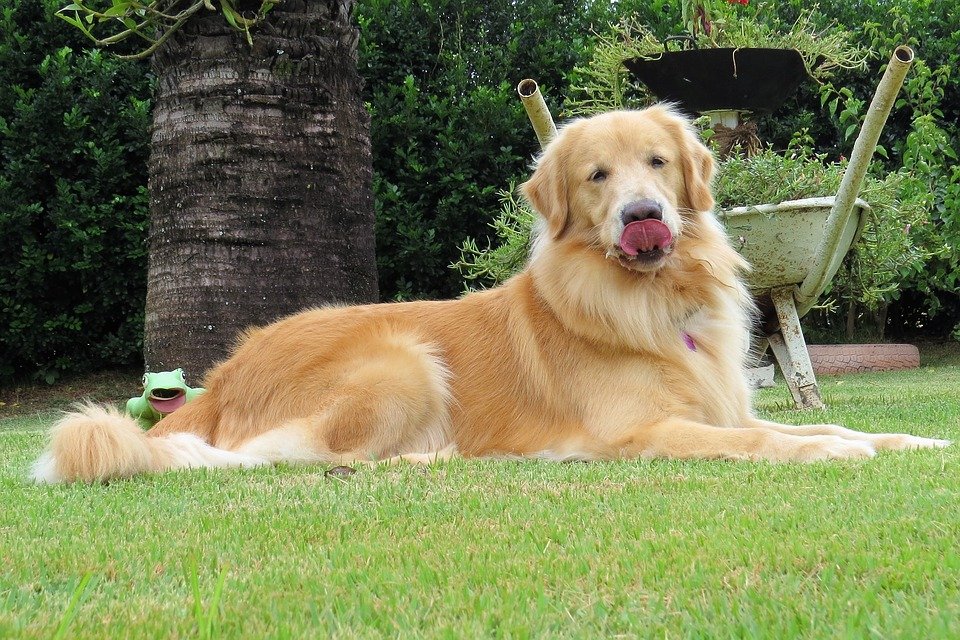We are going to discuss some simple ways to Stop Your Puppy Crying, as well as how to get your puppy to sleep through the night from the very first night.
We’ll discuss the causes of a puppy howling in their crate, as well as the reasons why a puppy might start crying at night. We’ll also share how long you can leave a puppy to cry for, give you tips for crate training at night, and help you learn how to get a puppy to stop crying and start having fun again.
Our team understands just how frustrating it can be when your puppy won’t stop crying after you bring him home. These tips will help you if your puppy will not sleep at night or wakes up every two hours crying at night. I also send out general dog and puppy tips by email, so be sure to enter your email address in the box below:
What Causes Puppies to Cry?
Babies cry to get their needs met and to alert those who take care of them that they are in danger. Usually, crying in young puppies is a response to a strong physical or emotional need. Examples include:
- Pain
- Hunger
- Full bladder/bowels
- Fear
Puppies may also learn to cry to get attention as they grow. Whenever a puppy has been consistently rewarded for making a sound in the past, the sound is learned. That comes later, but you should be aware of it so that you don’t cause yourself the trouble.
What Makes New Puppy Cry So Much?
Pain or hunger seldom cause puppies to cry if they are well-fed. Unless they’re trapped in their beds, they won’t usually cry if they have a full bladder. Instead, they will pee on the ground. During the first few days, your puppy will usually cry because of fear. It is not something he can control or something he is doing deliberately.
What causes puppies to whine?
You can think of it as homesickness. The worst kind. Puppies’ first-night ‘blues’ are so common that they are considered normal. Because your puppy doesn’t know when he will return to his family or where he will live. Even though puppies have short memories, they get over their sorrows soon enough. Still, for the first few days, you should expect your puppy to be scared, even if he doesn’t display it. If he’s left alone, he’ll be even more scared.
This does not mean that you and your dog have to be forever joined at the hip, but it does mean some temporary lifestyle adjustments. In a moment, we’ll discuss that.
What Causes Puppies To Cry At Night?
Unless they are close to a grown-up, most small puppies sleep quite well at night! How do you deal with a puppy who won’t fall asleep unless you are there?
Puppy won’t sleep unless he’s next to me!
In many cases, the nighttime crying that new puppy parents experience is caused by attempting to get their puppy to sleep alone on their first night. Sometimes this works out, and the puppy cries a little and then goes to sleep. In most cases, you end up lying awake with your fingers in your ears while your puppy screams the night away in the kitchen.
If you sleep next to your puppy for the first few nights or even for the first few weeks, you will not have any problems. This temporary arrangement offers many benefits to both you and your puppy.
The vast majority of puppies will sleep for several hours at a time when placed in a box or crate next to your bed. Most people will need to get up once or twice to go to the bathroom at night. A puppy’s need to go outside at night is another common reason for nighttime crying.
Leaving a puppy alone at night
Especially if you don’t want to leave your bed to be with your puppy at night or if you do not want the puppy to sleep in your room, you need to make sure that some puppy pads are available for the pup to use when peeing and pooping. In addition, most puppies can’t go all night without peeing at least once and you don’t want to force the pup to pee in their bed.
How long does a puppy cry at night?
Once your puppy has spent the first week or so sleeping next to you, and has now been moved into its permanent sleeping quarters, you will notice that any crying at bedtime will be brief. We’re talking about 10 or 15 minutes, maybe for a couple of nights. There are puppy parents who prefer the sound of a ticking alarm clock for their puppies, the sound may soothe them.
In contrast, if you leave your puppy alone on the first night, he may cry extremely loudly for some time. Next time, if you get them up again, they will cry even louder and for longer. They may cry for days and weeks in this way. Would it be best to leave your puppy to cry?
Should I Leave My Puppy To Cry At Night?
Some problems can arise if you let your puppy cry at night:
- Sleep disturbance
- Waking the neighbors
- Soiling
- Separation anxiety
- Puppy screaming in the crate for hours
Initially, you may think that the puppy will go to sleep fairly quickly. However, it doesn’t always happen that way. Sometimes puppies cry most of the night. No matter where you live or how big your house is, you’ll be able to hear the noise. The neighbors will also hear the puppy, so you won’t be the only one hearing it. Most of the neighbors won’t like it.
You won’t know when the puppy needs to go out to pee if you can’t hear him cry. When puppies are left to cry it out at night, they may become so distressed that they have diarrhea. They will then walk in and get diarrhea on their fur. I can tell you from experience that shampooing a puppy in the early hours of the morning isn’t fun!
Long-term problems such as separation anxiety may result from long-term distress. Overall, I think having the puppy next to your bed for a few nights is the more appealing option.
How long will a puppy cry at night? Are we talking minutes or hours?
In addition to puppies giving up within a half-hour of being left to cry if you leave them, there is also the problem that some puppies have an incredible amount of stamina, and can keep on crying for hours at a time!
How To Stop Your Puppy Crying At Night
You can stop your puppy from crying at night by bringing him next to your bed in a box or crate. As soon as the puppy smells and hears you, you can reassure him with your hand if he stirs or becomes upset.
Even though your new puppy will be far from their familiar den on the first night of their new life in your home, if they are next to your bed they will not be scared and you’ll both be able to sleep. There is no need to make this a permanent arrange Prepare your puppy’s permanent sleeping quarters by spending some time over the next few days.
How Long Do Puppies Sleep Through The Night?
Upon having a familiar, safe, ‘den’ in which to sleep, your puppy will stop crying when left alone at night, once they can get out of bed to pee. Your puppy is unfamiliar with the home at the moment.
Unless they are in the safety of a den, puppies in the wild are extremely vulnerable and should never be left unattended. Puppy instinctively calls out for assistance if they find themselves alone outside their den. As soon as they are inside, they will rest peacefully. You must create the ‘den experience’ in your home. There is no need to buy an expensive bed or blanket for your puppy. It is just a matter of familiarity.
Getting a puppy ready for bed
Your puppy’s crate or basket should become slowly his or her place of safety over the next few days by leaving treats and toys there. It will become their happy place.
When you are persistent and generous, this doesn’t take long. In this way, much of your puppy’s food ration can be used up. It won’t be long before your puppy begins taking naps in the crate during the day. A few days from now, they can sleep there without being afraid at night too.
Sleeping time for puppies at night?
Generally, puppies sleep quite well for about ten hours, from mid-evening until early morning (from around 8 pm to 6 am), with a bathroom break at bedtime and again during the first two weeks.
Even though it’s tempting to encourage a puppy to run around in the evening in hopes of wearing them out, it usually doesn’t work and may worsen the situation. Like a small child, a puppy can relax and sleep deeply with a reasonable bedtime. If you want to establish a bedtime for your puppy, crating him at night can help. If you put your puppy to sleep in their crate around 8 pm, but let them out for one last pee around 11 pm, you can start the night off right.
Can you close a puppy crate at night?
When you crate train your puppy during the day and create a den in the crate, you should close the door at night when you put them to sleep.
Why Do Puppies Cry During The Day?
When puppies are hungry, some will cry, but most will not so do not use crying as an indicator that your puppy needs more food.
During the day, puppies who are left alone while their grown-ups go to another room tend to cry the most. The best way to avoid this problem is to keep your puppy close to you as much as possible for the first few days of its life, and then to teach him to be alone in phases as you go along. Here’s a quick recap.
Teaching a puppy not to cry when left alone
This training consists of three stages.
- Conditioning of crates
- Through crate napping
- While leaving the room
Puppy owners should crate their puppies when they leave them alone to keep them safe. Having to live in a crate is one thing, but having to live without others is another. You will find that the whole process will be easier for you both if the puppy gets used to being closed in a crate before you leave them alone.
Conditioning crates
A puppy must be familiarized with being put in a crate during the process of crate conditioning. After the door has been closed behind them, the person is let out again (immediately)
Can my puppy nap in its crate?
It is the act of putting a sleepy puppy into a crate and waiting for him to sleep. As your puppy sleeps in the crate, you should remain in the same room with him. Bring the crate in with you when you want to watch TV.
Exiting the room
Here is the final stage where you will only leave the room for a few seconds at a time. To begin with, just a few seconds.
When To Let A Puppy Cry In A Crate
Your puppy may protest being shut in the crate when you start crate training. What’s the optimal length of time you should let your puppy cry in a crate? Leaving your puppy to scream repeatedly is not recommended. A puppy crying out its feelings is a risky strategy. Some puppies will cry so long that they need to go potty again. After that, you will have a bedwetting problem to deal with.
The best way to train your puppy to relax in a crate is to build his/her ability to do so gradually. Leaving a puppy in the room for more than a minute causes them to yell, so they should only be left for a minute or two at a time with plenty of treats fed through the bars at regular intervals, which you can gradually space out. You should also avoid teaching your puppy to cry to get you to let him out.
How To Crate Train A Puppy At Night
Crate training a puppy at night is different from crate training during the day (and easier). Even if your puppy objects to being created during the day, he or she will sleep soundly in a crate at night, provided that the crate is near you (or another dog) during the first few nights.
Puppy taught me how to cry.
Through the consequences of their actions, puppies learn. They acquire these skills rapidly. IA puppy’s crying will be reinforced (e.g., more likely to occur again in the future) if a good thing happens when it cries. He will be able that crying is a convenient way to get food, cuddles, attention, and company. There will be no sense of threat or worry.
The majority of puppies fall asleep quickly in their crates when they first arrive. Families go about their daily activities, relying on the puppies to alert them when they are awake and ready for more fun. However, the puppy’s only means of communicating his desire to stand up is through whining. This behavior can quickly become habitual.
Whining In A Crate
Whining in the crate is usually caused by the puppy learning to whine to get the door opened. Wailing to be let out of the crate is common. It’s best to pick up your puppy before it starts whining to avoid it. This prevents it from becoming a habit.
When taking your puppy out for a crate nap, wake him up after about 15 minutes. Play with your puppy for a few minutes, then put him back in his crate. Do not wait until the puppy cries before you get him up. If he does cry, do not open the door until he has stopped. Even if you crate your puppy during the day or at night, you must allow him to leave the crate often enough for him to keep himself clean. To help you, we have written two detailed guides.
Getting Puppies Used To Be Alone
Some veterinarian puppy packs include information on how to teach puppies to be alone, which is nice to see. From an early age, your puppy will likely spend some time alone if you go out to work. Many puppies, however, never learn this essential skill.
I know that my own veterinarian’s literature stresses the important fact that puppies that do not learn to be left alone before the age of thirteen weeks are more likely to develop separation anxiety later in life. In other words, puppies need to be accustomed to the experience of being alone sometimes at an early age. We need to work through this part of the socialization process with our puppies.
A puppy shouldn’t be left alone for a long period, or in an unfamiliar place. Nonetheless, within a few weeks of bringing your new puppy home, he should be capable of being left alone for ten minutes without screaming and pacing around the house.
According to one study, the majority of puppies left home alone for up to 60 minutes did not exhibit stress-related behaviors and those that were stressed improved after practice being alone. One hour is the maximum length of time that puppies are left alone. Young puppies should not be isolated for long periods.
How To Stop Your Puppy From Whimpering At Night In The Crate
Leaving puppies alone or crated is not the only reason they cry. Puppy puppies often cry for attention throughout the day and are highly vocal for a long time. Therefore, you shouldn’t ‘reinforce’ this kind of crying.
You should avoid rewarding a crying puppy by doing anything that might be interpreted as rewarding by him. Among these are picking him up, entering the room he is in, feeding him, talking to him, and letting him see you if he hasn’t already seen you. When your puppy does something you want to encourage, you should do all of these things as rewards for him
This is quite difficult for many people. You will soon notice that the amount of crying in your household will be minimal if you adhere to this rule, and make sure your family adheres to it too. Ensure that your puppy gets plenty of company, plenty of opportunities to use the outdoor bathroom, lots of safe toys to chew on, and a familiar, safe place to sleep to prevent potential crying episodes
Likewise, it is important to reinforce any periods of silence so that the puppy learns that being quiet is a better strategy for meeting his needs in our modern, illogical world. Silence can be reinforced by rewarding it.
How To Crate Train A Puppy At Night By Rewarding Silence During The Day
Any periods of silence your puppy experiences will likely be short if he has been yelling and crying. The puppy will probably start howling again by the time you reach him with a reward, and you will have rewarded the noise instead of the quiet. Using a word such as ‘good’ or a click from a clicker can serve as an ‘event marker’.
The first few days with a puppy in our home, I wore a clicker on a lanyard around my neck. The puppy is rewarded with treats or a cuddle when it is quiet when I press the clicker.
You can use this when your puppy starts yelling when you leave the room. Click for quiet when the crying stops, and then return. Reward the puppy with a treat.
Spending time alone
Over a few days, a puppy that cries when left can be asked for longer periods of quiet before you click. After two or three seconds, five, then ten, and so on. Continue this until you reach one minute.
Puppies learn quickly (within a day or two) that being quiet is rewarding. By the time you get to wait one minute, most of the crying will have stopped and the puppy will be quiet most of the time.
Puppy Crate Training
Puppies often have free reign of their home when they arrive with their owners. When puppies are first brought home, confine them to one or two rooms to help them feel comfortable. It also gives other family members a place to escape from tooth-biting puppies! When your puppy feels safe in his ‘new den,’ the sooner he will be content to stay there, and the sooner he is content, the sooner he will stop crying.
You should remember that, when your home begins to feel like their home, your Labrador puppy will stop crying as long as he has not learned to cry to get a reward. Giving a puppy the freedom and access you would give to a human guest might seem right, but puppies do not need freedom. They need company and a little time to adjust to their new life.
How To Stop Your Puppy From Crying In A Nice Way
The gentle and gradual approach to raising puppies and teaching them to be alone can sometimes worry people. You must recognize, however, that leaving a puppy to cry alone will not make him tougher. Studies have shown that puppies who receive more maternal care (in this case you are now the substitute carer) are more confident and brave. This is one of the reasons why I no longer use the ‘crying it out’ option with my puppies.
Researchers examined separation distress in 24 young puppies published in 1977 and found that human company was the most effective means of alleviating separation distress in puppies. A dog is better than a toy, a dog is better than food, and a dog is better than another dog. Therefore, you need to spend time with your puppy.
That doesn’t mean your puppy must always have a companion. However, he also needs to learn how to be alone, but those first few days in your home are a special case. Spend as much time with your puppy as you can, especially in these early days. Puppies need a sense of security. Get it right and the crying will cease.
How To Stop Your Puppy From Crying
- You should avoid triggering the puppy’s fear response or teaching him to cry for attention
- During the first four or five nights, you should have the puppy by your bed.
- From the second week on, let your puppy spend short periods alone during the day
- And then gradually increase the amount of time alone
- each day. Provide plenty of attention and interaction for the puppy.
How long do puppies cry for First Night?
It depends. Some puppies cry every night for the first one or two weeks while others only cry the first night or two. Your puppy might cry the entire night or he might only cry for an hour or so until he passes out.
Should I let my puppy cry it out in the crate?
Once your dog is standing comfortably in the crate to eat his meal, you can close the door while he’s eating. If he does whine or cry in the crate, it’s imperative that you not let him out until he stops. Otherwise, he’ll learn that the way to get out of the crate is to whine, so he’ll keep doing it.
Should I ignore puppy crying at night?
Ignoring them at night won’t help them build confidence and may make them worse which isn’t what anyone wants. They need to be taught how to be independent slowly. We would never recommend ignoring your puppy when they cry at night, especially in their first few nights.
How long should you let puppy cry in crate?
Most of the time we recommend that your pup be settled for 5 or more minutes before being let out of their crate. The most ideal scenario is that your pup cries for a bit, but settles in under 30 minutes and falls asleep.
Should I let my 8 week old puppy cry at night?
Letting your puppy sleep next to you for the first few nights or even the first few weeks is not going to cause you long term problems. But most will need to wake and get up once or twice at night to go and pee. So the other cause of night time crying is often due to the puppy needing to answer the call of nature.
Where should a puppy sleep the first night?
On the first night, and for about three weeks, have the puppy sleep in a dog crate next to the bed. Line the base with blankets so that it is cosy and drape another blanket over the top to help it feel more secure. Give the puppy the stuffed toy that has its littermates’ scent on it to snuggle up to.







